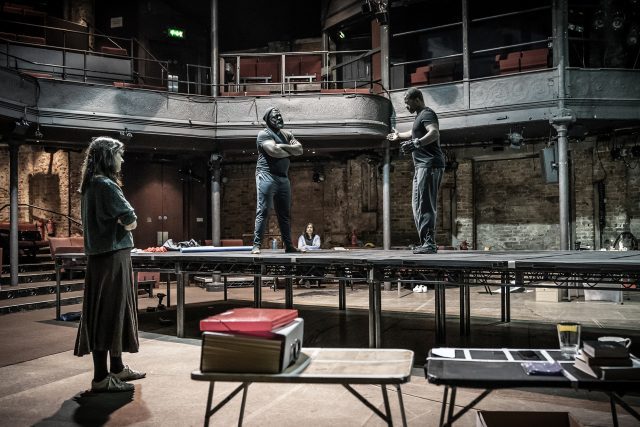
Danny Sapani and Adrian Lester rehearse Hymn with director Blanche McIntyre for livestream (photo by Marc Brenner)
HYMN
Almeida Theatre
Available on demand through March 9, £15-£40
almeida.co.uk
Last month, London’s Almeida Theatre streamed several live performances of Lolita Chakrabarti’s new play, Hymn, followed by two discussions, all held with no audience. A recorded version of the sizzling two-character show is now available on demand, but only through March 9, so act quickly if you want to catch this stellar production. (You can watch the discussions any time here.)
The play starts with the two actors, Adrian Lester and Danny Sapani, walking onto the long, vertical wooden thrust stage wearing masks. They stop on opposite sides of a piano, turn off the house lights, click on a metronome, walk down the set, and circle around a small bottle of booze and a Bible, two items that men turn to in times of strife. Gil (Lester) picks up the latter, while Benny (Sapani) scoops up the former. They determinedly remove their masks, and the sound of shattering glass kicks off the dialogue.
“What the hell?” a surprised Benny, wearing a dark T-shirt, shouts at an unseen barman. “Get off me! Move your fuckin’ hands! . . . Been a shit day; I just’ wanna drink! People to stand next to. Nothing wrong with that, is there?” Actually, in the era of Covid-19, there is a lot wrong with that, and although the coronavirus is not part of the play, it is central to director Blanche McIntyre’s compelling staging.
Gil and Benny meet each other at the funeral service for Gil’s beloved, well-respected father, Augustus Clarence Jones, a successful stationer and family man known affectionately as “Gus.” But Gil is forced to reevaluate his father’s image after learning that Benny is his half-brother, only six days younger, the product of an affair between Gus and Benny’s mother. Gil rejects Benny’s claim outright at first, but soon they are having an exhilarating bromance, living a kind of fantasy, until reality takes hold again.
Hymn is beautifully written, directed, acted, and, perhaps most important, filmed. Even though this version is prerecorded with no audience, it has the feel of live theater, as photographed by screen director Matt Hargraves and his team of camera operators. McIntyre (The Writer, Women in Power) does a terrific job of keeping the two actors apart — they never come into contact with one another, never touch the same objects, keep at least six feet apart when standing still, even as they grow very close emotionally on the narrow stage. Chakrabarti (Last Seen, Life of Pi), who is married to Lester — the playwright and actors have all worked together previously, and Chakrabarti wrote Hymn specifically for her husband and Sapani — has created a fascinating relationship between the two men, who, despite sharing the same father, are very different people, neither exactly what they first appear to be. There’s nothing new about the plot itself — someone shows up at a funeral to claim they are a long-lost or hidden-away relative — but it’s treated with such care and humor that you’ll be sucked in immediately.
The spare set and costumes, which come into play big-time in one exhilarating scene, are by Miriam Buether, with lighting by Prema Mehta, sound by Gregory Clarke, and musical direction by D. J. Walde. The show features a handful of songs sung by Lester and Sapani, including Bill Withers’s “Lean on Me” and the Temptations’ “Papa Was a Rolling Stone,” which easily could have been schmaltzy but instead point at how much the half-siblings need each other.
Hymn is a moving, powerful ninety-minute piece that, though a product of its time — it also delves briefly but critically into the BLM protests — well deserves to be brought back post-lockdown, when audiences will be able to absorb its elegance and artistry in person. Lester (Company, Sweeney Todd), who battled the coronavirus with Chakrabarti over Christmas, and Sapani (Invisible Cities, Big White Fog) capture their evolving feelings of brotherly love with intelligence and grace, fully immersed in the characters’ ever-more-complicated lives, sharing what Benny calls “sympathetic resonance.” In his eulogy at the beginning, Gil remembers his father telling him, “Music is silence, sound, and time. If you listen, Son, you’ll hear it too.” You can experience all that and more in this special production.